Is GSC ranking data accurate? If you ask most SEOs these days, they’ll tell you that this data is way off. However, Google employees have said that the data should be quite accurate.
As such, we set out to do a small scale test to determine whether this was true.
Hypothesis
We believe that for most keywords, the ranking data shown in Google Search Console is reasonably accurate (i.e. within one ranking position) for most queries.
Method
We took ten sites for which we have GSC access. All sites were based in the US with a primarily American audience.
For each site we looked at ranking data from the Performance section of beta GSC. We set the following filters:
- Just looking at one date (July 13, 2018). We found that if we looked at the last 7 days, there was much more variation as many keywords would shift rankings in this time.
- Limiting the results to US searches.
- Only looking at desktop rankings.

We looked at the first 10 listed keywords for each site and excluded brand and url terms.
For each keyword we listed the reported GSC position on July 13, 2018 and compared it to the actual ranking that we saw. Actual rankings were done on an incognito search using US based Google.com.
Results
We were surprised by the results. In most cases, unfortunately GSC was not terribly accurate when it came to reporting ranking positions. We found that some keyword rankings were way off. In many cases, we felt that this could be due to locational differences. For example, our client might have a page 2 ranking in most of the country for one phrase, but have high rankings in a small handful of cities for those terms. We are thinking that this will mess up the average ranking for those keywords.
Here are some charts that show GSC’s rankings (in blue) as compared to what we found on an incognito, non personalized US search, for several of our clients. For each of these, if the two lines are very similar, it means that GSC and real life rankings are quite close. Where there are large gaps between the blue and red line, this means that the GSC ranking was significantly different than what we were seeing.
Nationally recognized eCommerce site
- 80% of keywords are within one ranking position as reported on GSC
- 100% of keywords are within two ranking positions as reported on GSC
Large informational site
- 50% of keywords are within one ranking position
- 50% are within two
- 50% are within three
This site had a lot of inaccuracies. One of these keywords was being reported as ranking extremely well when in reality we saw it ranking on page 3. What we don’t know, though, is whether this was because that particular keyword had just recently dropped in rankings, or perhaps Google was temporarily testing it in a high ranking position, and the ranking we were seeing in GSC was only temporary.
If we take that keyword out, we get the following. You can see that one keyword s ranked around #2 in GSC, but #6 in real life. For another, GSC reports #5 when in our incognito, non personalized searches we saw it at #2:
Large medical information site
- 70% of keywords are within one ranking position.
- 90% are within two.
- 100% are within three.
The stats are much more accurate for this site. Still, many keywords were ranking at one or two positions different than what is in GSC:
Large medical information site
This site had relatively accurate reportings for keyword rankings in GSC
- 70% of keywords were within one ranking position.
- 100% were within two.
Large lead gen site
This site was tricky to analyze because many of their terms had local intent. Therefore, they might rank really well for a search for “green widgets” in NYC, but poorly in LA. If you have a lot of variance in how you rank according to location, even organically, we believe that this can mean that GSC is less accurate.
- 40% of keywords were within one position.
- 40% of keywords were within two positions.
- 80% were within three positions.
Large directory type site
- 80% within one position
- 100% within two positions
Nationally recognized eCommerce site
- 60% within one position
- 70% within two positions
- 100% within three positions
Attorney website
This was a tough site to analyze as many of the terms here have local intent. GSC is reporting them as ranking #1 for “injury lawyer [their city]”. But, our search that was generalized to all of the US had them at #6 organic. These results are tough to interpret:
- 40% within one position.
- 50% within two positions.
- 60% within thee positions.
National eCommerce brand
- 80% within one position.
- 90% within two positions.
- 90% within three positions.
For the most part, rankings were relatively accurate in GSC for this site.
Conclusions and discussion
We had expected to see less disparity between what GSC reports as rankings and what is happening in real life. However, there are some limitations to this study:
- Keywords with local intent will not always be accurately represented in GSC.
- It is possible that some keywords that we covered had wide ranking shifts. It’s not uncommon for Google to test a ranking at high position for a day and then pop you back down to a much lower ranking.
- We only covered a small number of sites in this test. Ideally, we would love to do this on a much larger scale.
Our conclusions after looking at this data is that for some sites GSC ranking data is reasonably accurate, but will never be perfect.
For sites with differing rankings in different cities, GSC data is often going to be way off.
We still do feel that ranking data in GSC can be helpful. However, it is important to note that this data is never going to be 100% accurate.
Stay tuned for part two!
We plan to extend this study and look at how some of the popular rank trackers stack up here. Hopefully we will have that out soon. You can subscribe to my SEO newsletter to be notified of when the new post is live.
What is your experience?
Do you feel that GSC ranking estimates are accurate for your site? We would love for you to leave a comment with your thoughts.


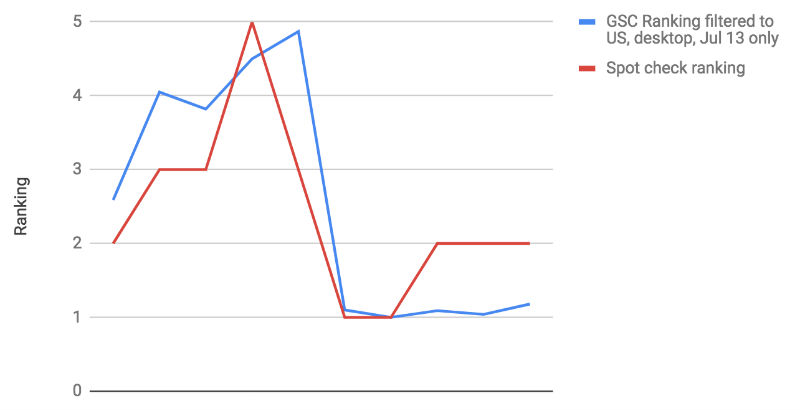
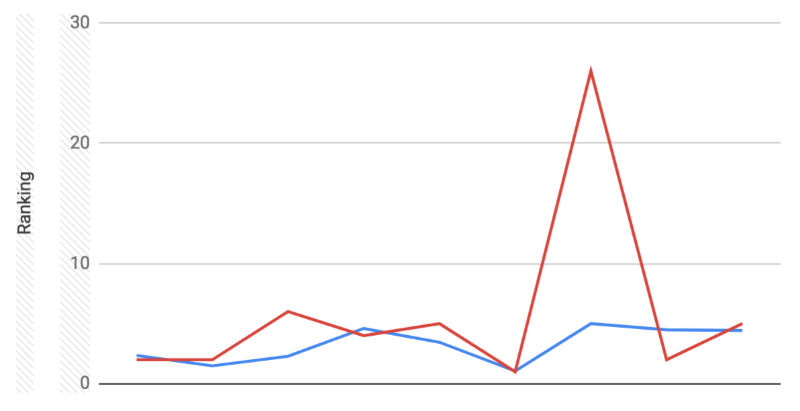
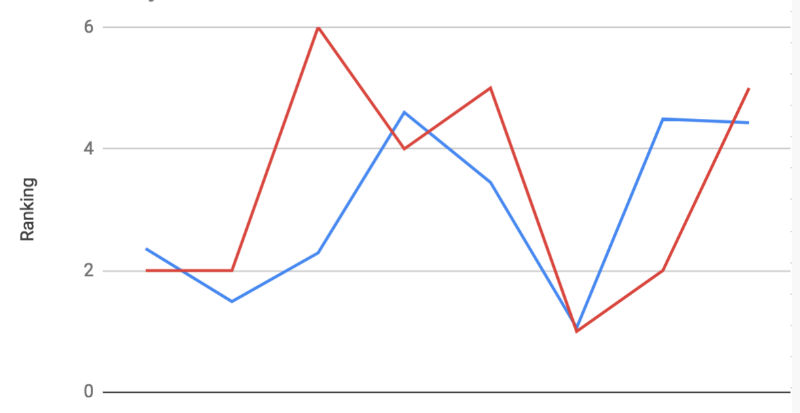
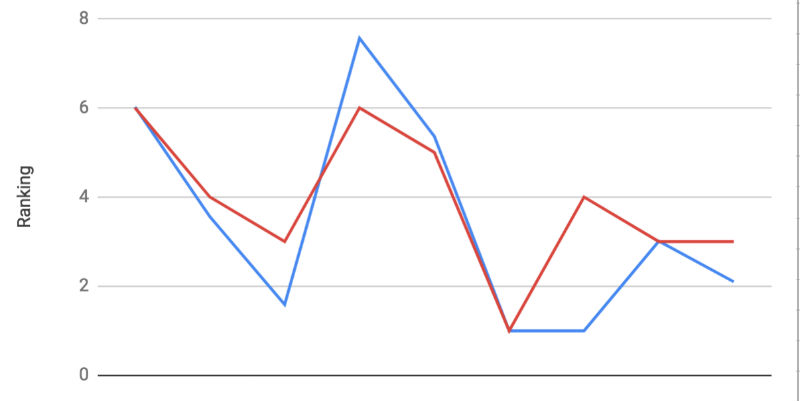
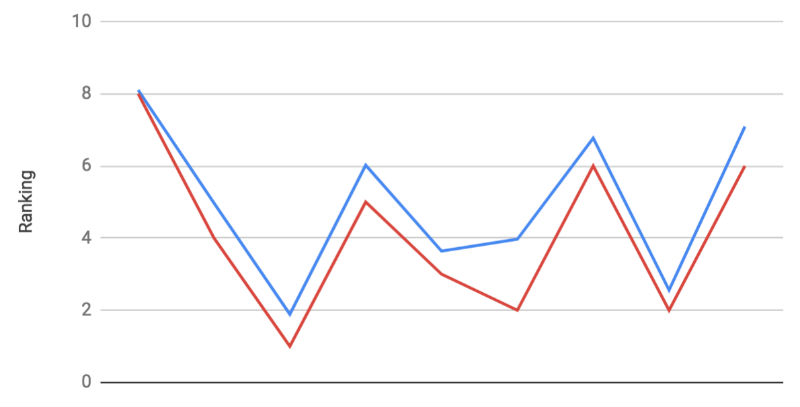
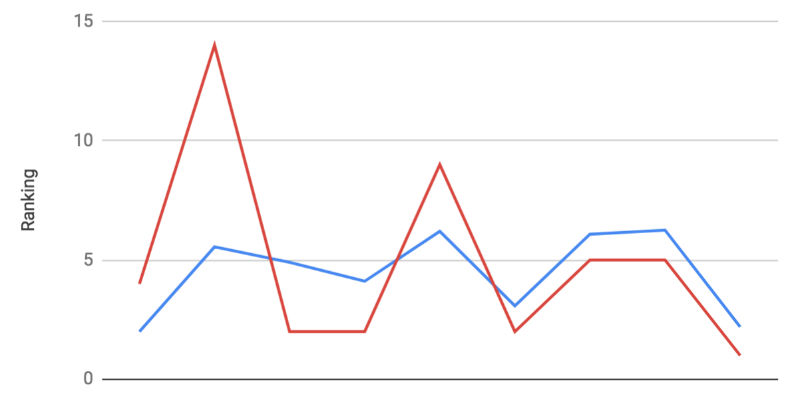
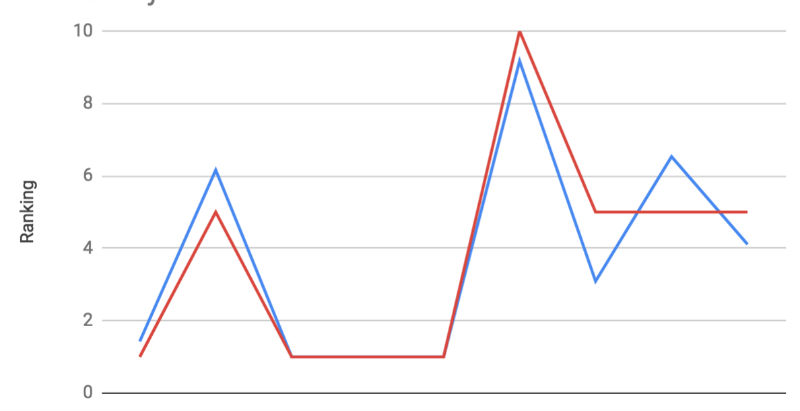
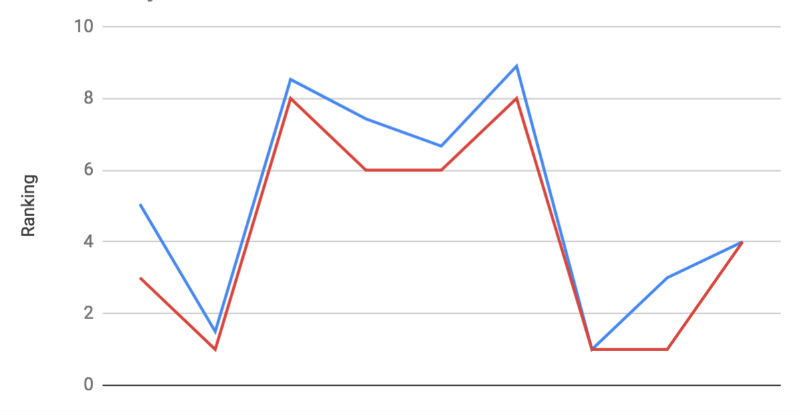

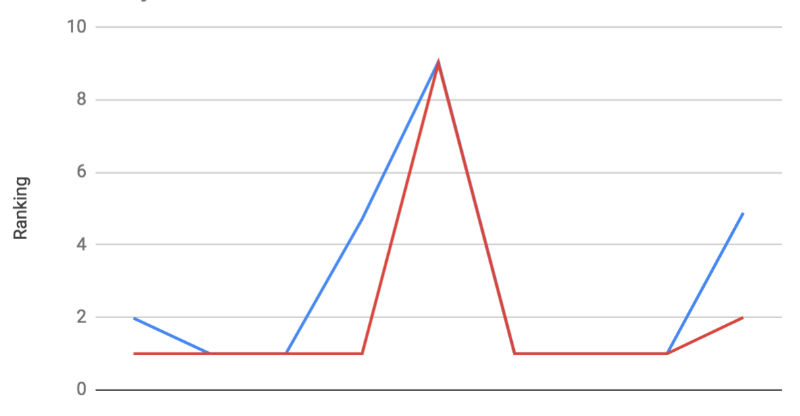

Comments
Good analysis Team MHC 🙂
Can I ask;
* Were these searches all carried out on the same device or across multiple devices?
* Were the searches always in the same browser or tested across several (i.e, Chrome, Edge, Brave, Firefox, etc)?
* Were all searches sharing the same internet (IP) connection?
I’d be really curious to see the same study carried out across a number of different devices, using different browsers, with different IPs (i.e, one over ethernet, on via a mobile internet device, another tethered via a phone).
Hi Dale. Good questions.
Searches were all on desktop, on the same device using Chrome in incognito. I like the idea of trying searches across different devices, IPs etc.
Hi Marie,
have you taken into account the local pack when measuring the rankings? (results from Google My Business)
I suspect that Google Search Console includes these local pack positions into the overall average position.
In many cases when I rank steadily on top in the local pack and 3.-5. in the “standard” organic, Google Search Console reports 1.1 as the average position.
What do you think?
Hi Marie,
Thanks for conducting this experiment/study. I would be interested in seeing stats on not just different devices and IPs but also different states/regions. I think its smart to consider various industries like you have.
Great work! Great article!
Hi Marie
The majority of terms we see for our UK accounts show considerably more disparity and I had assumed GSC was pulling the rankings data from google.com. There appears to be considerably more scorrelation between the click data and analytics data, so I’ve tended to user the click and impressions data to confirm terms being picked up in a Google and the fed these into a ranking tool., such as Moz to check ranks.
Have you looked at any non- US data?
Great work,?btw
Best wishes
Peter
Thanks Peter. We didn’t look at non-US data but that’s a good idea. Wish we had more time to keep investigating this!
Really interesting research. This has been the subject of many discussions over the years.
Surely the challenge is to manually check something that is based on thousands (if not more) of searches?
Plus, your testing was done in incognito mode, while most people probably don’t actually search that way, leading to a natural disparity between GSC and your tests.
Either way, however accurate GSC may be I fail to see how anyone else can claim to have a more accurate and reliable dataset. This feels like the best we are going to get so I often use it but with a caveat on the accuracy.
Great work! Thanks.
Our product page in Ukraine and the majority part of our customers from USA (60 %), UK (15 %), Netherlands (10 %) and Germany (<10 %).
And we saw huge desparity for the most popular keywords (in our industry of course). But more accurate data for less popular leywords.
I assume the The problem we have is that Google uses average positions.
Sorry for writing in my poor English
I knew I couldn’t trust it.
Hai Marie
Thanks after reading this makes my mind open, one question whether google console is only accurate in certain countries?
I wonder if you have any insight as to why this is happening and if it is widespread?
eg. Settings for 3 months
150+ urls in top 10/20 for the same ‘generic’ search term (happens for various search terms) but due to not being the MOST relevant url from the website for the search term = VERY low (0%) CTR.
I don’t know why these urls are seemingly ranking – I assume these search queries are from people being logged in but don’t know why these urls would be showing so highly for them, when there are more relevant urls – and this is evident when searching incognito etc and when looking at analytics.
Example: Search term ‘Manchester Greengrocer’ (of which the homepage would usually rank for this term)
but the url/page is for “Review of Green apples” ranks on P1… (seemingly) – but due to very low CTR will eventually drop for that search term. (after a few days/weeks – it varies) This usually happens when a post is published (WordPress) or within a day or two.
I don’t see ‘actual’ evidence of these search results – only what is being displayed in GSC.
Hard to say without digging in, but it certainly is possible that these are from personalized searches. Another possibility is that they are ranking on image search.
We examined the number of “impressions” for a particular search term in GSC and the number of impressions shown in Google Adwords. There was a huge discrepancy.
Our client runs a domestic cleaning business which is provided in an easily defined metro geographical area.
In Adwords impressions for “house cleaners nameofcity” were huge, in GSC not very many for the same period.
We think that filtering for country in GSC might be skewing the results.
Thank you for analyzing this matter. However, IMHO the questions is not answered if Google shows accurate data or not. If you want to challenge the GSC Data you would have to run thousands of tests in different regions / devices etc.
I did come to this blog post because I do see quite a gap between what different tools are reporting and what GSC shows regarding ranking data. The actual traffic I do see on the site is much better reflected by the GSC data. Just my two cents.